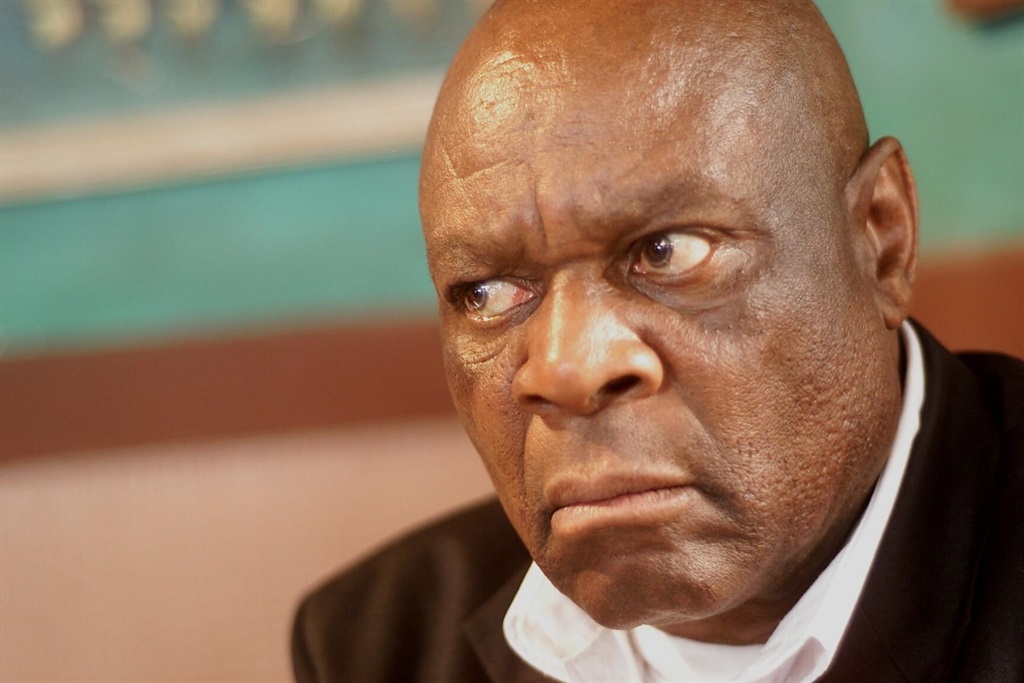
Patrick Ndlovu didn’t act. He became one with his characters. A consummate and brilliant professional, the passion for his craft and the realistic touch with which he conducted himself in front of rolling cameras are evident in every role he has portrayed.
Audiences could hear his booming, threatening voice and see the menacing scowl on his face long after the list of credits had dropped down the screen. The old trouper was a rare breed and natural talent in the business.
In the early years of black television, Bra Styles – as he was known among close associates and colleagues – was already a recipient of a treasured award bestowed on him for his consummate acting skills.
READ: Sarafina stars reunite in New York to celebrate 30 years of the movie
The accolade was the best male actor award for exceptional performance in a lead role in Khumbula Tata (1982), the first isiXhosa television drama series that was launched at the dawn of black television in the early eighties. It’s a romantic tale of forbidden love and involves a devoted father who wanted the best for his daughter by arranging a loveless marriage for her with the son of a wealthy business partner. But to her father’s disappointment, she only has eyes for a struggling motor mechanic.
His next prominent role on the small screen was Mudli ka Zulu in William Faure’s epic historical drama, Shaka Zulu (1986). Mudli is King Senzangakhona ka Jama’s prime minister and a resolute figure who’s prepared to put his life on the line in defiance of the ambitious and arrogant young prince, uShaka ka Senzangakhona – famously depicted by the late Henry Cele.
READ: Fred Khumalo | The Zulu royal family's ties of blood
In the Shaka series, Ndlovu’s acting talent shines through among a constellation of local and global stars – the likes of Edward Fox, Bingo Bentley Mbonjeni, Robert Whitehead, Roland Mqwebu, Vuyisile Bojana, Simon Mabhunu Sabela, Sam Williams, Alfred Nokwe, Washington Sixolo, Nomsa Xaba, Daphney Hlomuka and the beautiful Dudu Mkhize as Queen Nandi.
Since this part, Bra Styles has largely been typecast in villainous roles, which he seemed to have relished. Perhaps a lesser known but nevertheless colourful baddie role is that of Cornelius Radebe, the tough and ruthless underworld character in the SABC television series, Honeytown (1994).
This was two years after Sarafina!, the blockbuster Anant Singh film based on Mbongeni Ngema’s Market Theatre and Broadway hit stage production of the same name.
Of course, his temperamental character backfires when pupils turn against him, triggering a riot that invited the ruthless intervention of the police. Years later, he revealed how scared he was when an assortment of missiles from the hands of schoolchildren rained on him during the shooting of the classroom scene.
"The attack was so real. I could feel their anger and defiance of authority," he said.
And who can forget his no-nonsense character of Mr Thembu, the school principal in the landmark TV series, Yizo Yizo? Sizwe Moloi, the heartless drug lord and undertaker in Zone 14 – the SABC2 football series – was the culmination of these baddie characters.
READ: Life is a cabaret. . .
Born on November 15 1938 in Randfontein in the west rand, Patrick Ndlovu was raised in old Madubulaville, a freehold location whose black and coloured inhabitants were forcefully removed under the Group Areas Act and relocated to Mohlakeng and Toekomsrus townships, respectively.
In his teenage years, he was a gifted drummer destined for greatness in the world of jazz. However, a fortuitous encounter with Gibson Kente – the father of township theatre – slightly changed his course.
Around this time, he also worked with Des and Dawn Lindberg, folk singers and the most influential showbiz couple in the world of stage musicals at the time. In 1973, they staged their version of Godspell. Originally a 1971 off-Broadway musical based on the book of Matthew, it premiered in Maseru, Lesotho, where it enjoyed a successful run for five months. But when it later opened at Wits University, authorities banned it on the spurious reasons that it was blasphemous. The real reason was the cast’s multiracial character.
The couple challenged the banning in the Supreme Court and in a landmark case, the judge ruled in their favour. Poor apartheid was in trouble as the production opened its doors to audiences of all cultures. Ironically, when Des and Dawn released And the Seagull’s Name Was Nelson – about a boy who rescued an oil-soaked bird – they failed to decipher its actual political connotations: Robben Island prisoner Nelson Mandela and his quest for freedom.
They included Ben “Satch” Masinga, Thandi Klaasen and daughter, Lorraine, saxophonist Duke Makasi, Harriet Matiwane, singer Sammy Brown, Sponono star Cocky “Two-Bull” Tlhotlhalemaje, Felicia Marion of Joy fame, Bruce Millar and bassist Sipho Gumede of Spirits Rejoice. The Black Mikado went on to play nationwide to critical acclaim before it toured Greece and Israel.
One of the most successful shows at the Market Theatre during the dawn of democracy was The Good Woman of Sharkville (1996), an adaptation of Bertolt Brecht’s The Good Woman of Szechuan (1942) – described as a ‘parable play on urban poverty’.
Adapted by Gcina Mhlophe and Janet Suzman – who also directed it – it found a new life in a post-apartheid South Africa in a fictional city named Sharkville, a dangerous place inhabited by villainous characters. This is of course Patrick Ndlovu's territory.
And in many theatrical works, he shared the stage with some of the country's luminaries – the likes of Selaelo Maredi, Sello Maake Ka Ncube, Nomsa Nene, Magi Williams, Sello Motloung, Alistair Dube, Pamela Nomvete, James Ngcobo and the late Lindelani Buthelezi. Other screen roles included Cry Freedom (1987) and A Dry White Season (1989).
Ndlovu (85) died of natural causes at his Randfontein home. He’s survived by his wife and a daughter.




 Publications
Publications
 Partners
Partners









